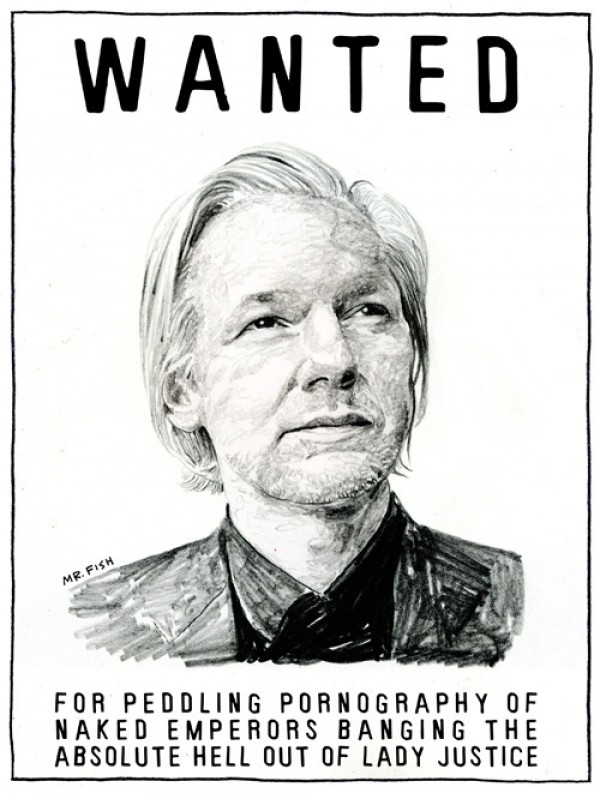Artwork by MAX FISH
NEW YORK TIMES: “The government of Ecuador, faithful to its tradition of protecting those who seek refuge in its territory or in its diplomatic missions, has decided to grant diplomatic asylum to Julian Assange,” said Foreign Minister Ricardo Patiño, reading from a government communiqué at a news conference in the Ecuadorean capital, Quito. He added, “There are indications to presume that there could be political persecution,” and that Mr. Assange would not get a fair trial in the United States and could face the death penalty there. The move gives Mr. Assange with protection from British arrest, but only on Ecuadorean territory, leaving him vulnerable if he tries to head to an airport or train. The decision added to the sharp strains between Ecuador and Britain. Mr. Patiño said he hoped Britain would permit Mr. Assange to leave the embassy for Ecuador. But at a news conference on Thursday in London, the British foreign secretary, William Hague, repeated the government’s stance that there was Britain was legally bound to to extradite Mr. Assange to Sweden, where he is wanted for questioning over accusations that he sexually assaulted two women. Just before the announcement of asylum, President Rafael Correa rejected British efforts to secure a handover, saying on his Twitter account: “No one is going to terrorize us!” The night before, Mr. Patiño said that the British authorities had threatened to force their way into the embassy, to which he responded: “We are not a British colony.” MORE
REUTERS: It is unclear how obtaining asylum in Ecuador would help. He is in breach of his British bail conditions and will be arrested if he steps out of the embassy, which is located in London’s ritzy Knightsbridge area, miles away from any airport. “A grant of asylum from Ecuador would not protect him from extradition to Sweden,” said lawyer Roger Gherson, an expert on British immigration law and related human rights issues. “It’s not a get-out-of-jail-free card for any conduct anywhere in the world,” Gherson told Reuters. It appears unlikely that the British government would give Assange safe passage to an airport as that would mean going against the Swedish arrest warrant and a ruling by Britain’s own Supreme Court that the warrant was valid. It would also mean letting Assange get away with breaching his bail terms. British and Ecuadorean authorities have been discussing the case, but neither has indicated what the solution could be. […]
Assange, who presents himself as a champion of free speech seeking to expose the dark secrets of governments, has not said in public why he decided to seek asylum in Ecuador, a country accused by human rights groups of seeking to muzzle the media. The only known link between him and the South American country is an interview Assange conducted with President Rafael Correa on Kremlin-sponsored TV channel Russia Today in May. The pair traded flattering comments during the 25-minute interview and Correa joked with Assange that he had joined “the club of the persecuted”. Correa, like the presidents of Venezuela and Bolivia, is a staunch opponent of what he sees as U.S. imperialism in Latin America. MORE

